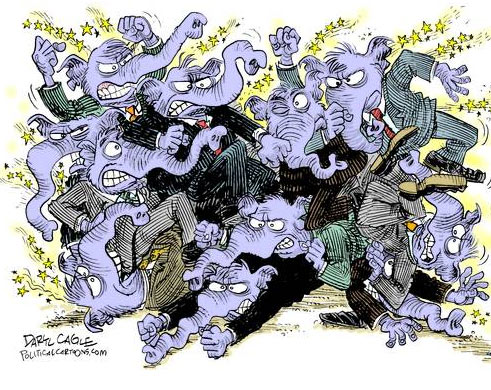
If you want to see what divides Republicans in Congress, don't look at the struggle to repeal and replace Obamacare. Look at spending. The House's narrow passage of a partial repeal of Obamacare dominated media for days. Happening at the same time, but receiving relatively little coverage, was the Senate's approval of a $1.1 trillion spending bill that revealed -- far more than Obamacare -- the deep differences among Republicans in both houses of Congress.
The story is in the numbers. On Obamacare, 217 Republicans voted for partial repeal, while just 20 -- a little under 10 percent of the House GOP conference -- voted against it.
On the spending bill, just 131 Republicans voted yes, while 103 GOP lawmakers -- about 43 percent of the House GOP conference -- voted no. In the Senate, 32 Republicans voted yes, while 18 GOP senators -- about one-third of the Republican side -- voted no.
Lawmakers gave several reasons for rejecting the leadership's spending deal with Democrats. "This bill funds sanctuary cities, funds Planned Parenthood, it funds Obamacare and I think that was unfortunate and it's a real missed opportunity," Sen. Ted Cruz -- a no vote -- told San Antonio radio host Trey Ware. "There is a reason Chuck Schumer and Nancy Pelosi are celebrating, because the spending measure funds everything they want and funds virtually none of the priorities we were elected to fund."
"I think the Democrats cleaned our clock," said Sen. Lindsey Graham, another no vote. "I'm for comprehensive immigration reform, but sanctuary cities go untouched. Obamacare continues to be funded in a way that we all say is illegal."
"Drain the swamp, right?" asked Rep. Dave Brat, another no vote, in Buzzfeed. "Where is that in the budget? Nowhere. We fully funded the swamp."
Another House Republican no vote pointed to a provision in the spending bill that would double the number of so-called H-2B visas to allow temporary low-wage foreign workers into the U.S. -- a move a number of experts said would lower wages for American workers.
"H-2Bs will be an issue and will cause a loss of conservative support for the bill," the member said shortly before the vote. "Very un-Trumpian to ban border wall construction and fund sanctuary cities while also expanding foreign labor!"
Foreign labor was a key factor in the no vote of Sen. Tom Cotton. In a floor speech Thursday, the Arkansas Republican explained that he recognized the good parts of the bill, in particular more defense spending. But he focused on the H-2B provision, not just because it is bad policy -- he explained at length what that is so -- but because it "shows just how bad this process is."
"It's not necessary," Cotton said of the visa expansion's inclusion in the bill. "It has nothing to do with funding the government, nothing. It hasn't been vetted. It hasn't gone through the normal legislative process, which would be the Judiciary Committee, where the chairman and the senior Democrat both have written that they oppose this measure. I don't even know how it got in (the bill)."
And yet there it was. And President Trump signed it into law.
In the end, the spending bill votes revealed significant divisions among Republicans about the amount of spending -- more precisely, the amount of deficit spending -- they can tolerate. Those differences extend far beyond their conflicts over Obamacare repeal.
A grand total of 20 GOP House members split with their leadership on health care, while 103 did so on spending. In the Senate, where the Republican majority is so narrow they have just two votes to spare, the GOP lost 18 votes. Those are signs of problems ahead.


 Contact The Editor
Contact The Editor
 Articles By This Author
Articles By This Author